Unit 9 Section B(3a-3c) 九年级英语全一册同步精品课件(人教版Unit 9 I like music that I can dance to.)
文档属性
| 名称 | Unit 9 Section B(3a-3c) 九年级英语全一册同步精品课件(人教版Unit 9 I like music that I can dance to.) | 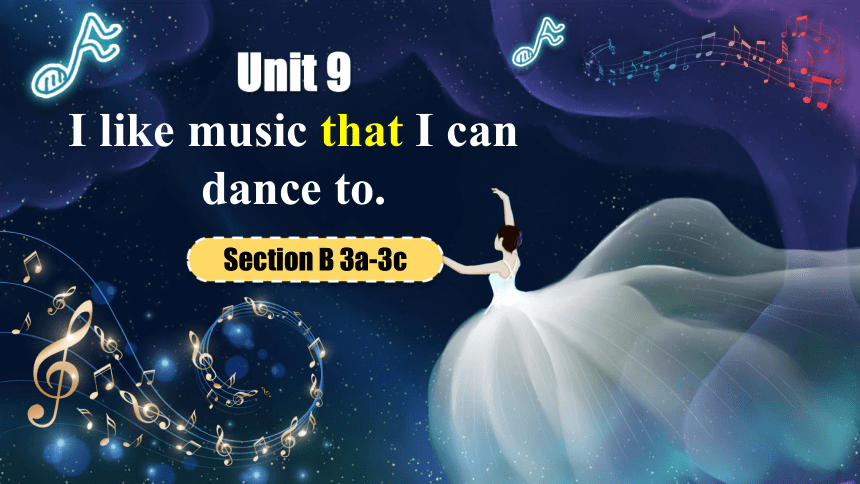 | |
| 格式 | pptx | ||
| 文件大小 | 102.2MB | ||
| 资源类型 | 试卷 | ||
| 版本资源 | 人教新目标(Go for it)版 | ||
| 科目 | 英语 | ||
| 更新时间 | 2024-11-27 16:42:26 | ||
图片预览

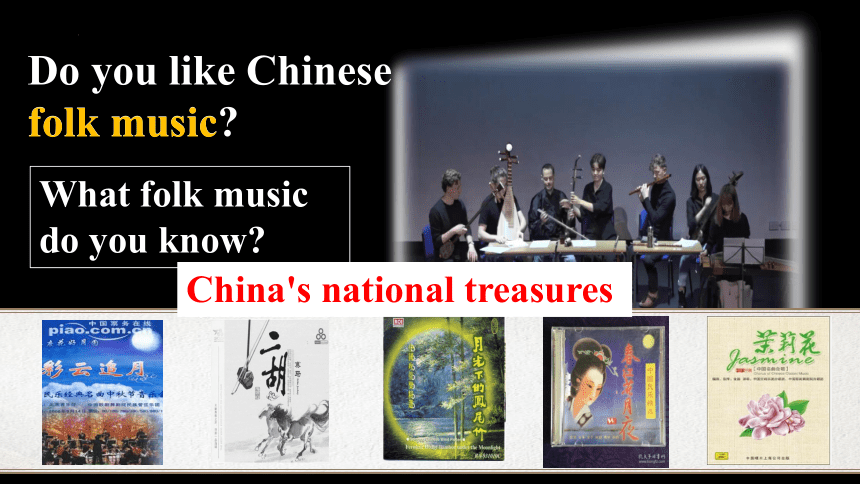
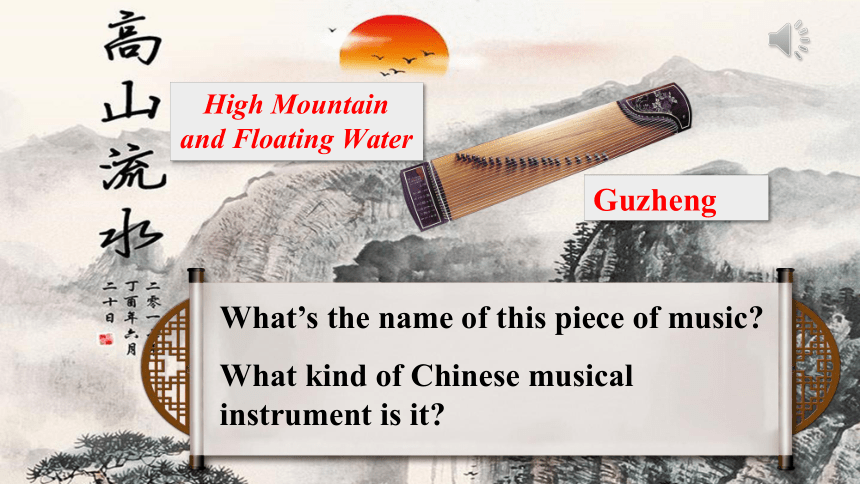
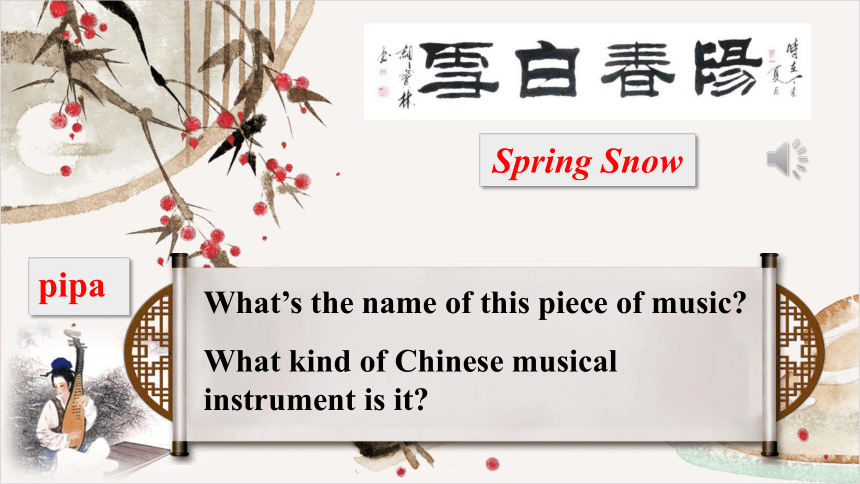
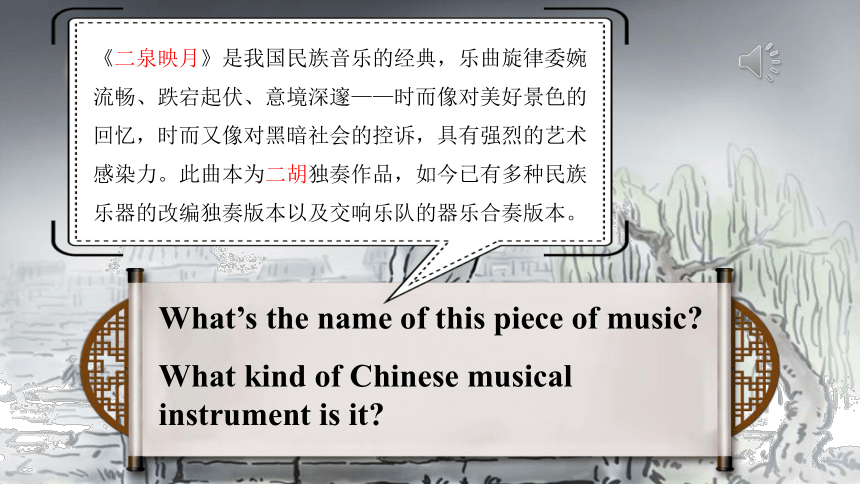
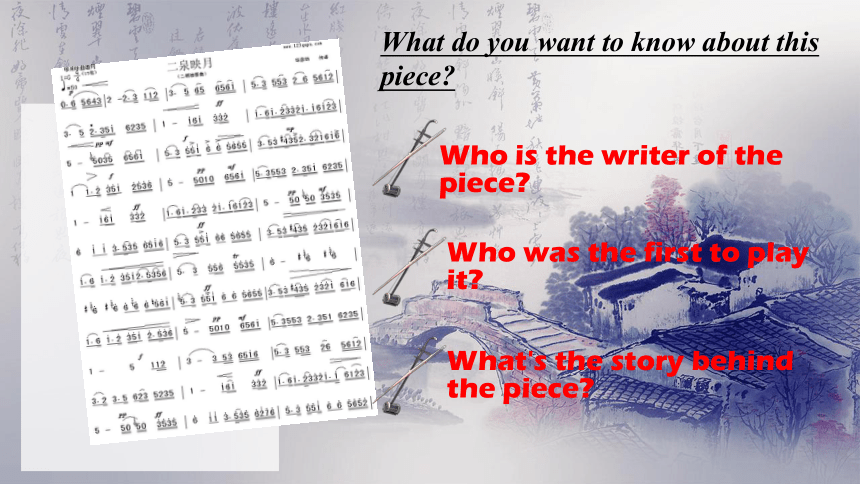
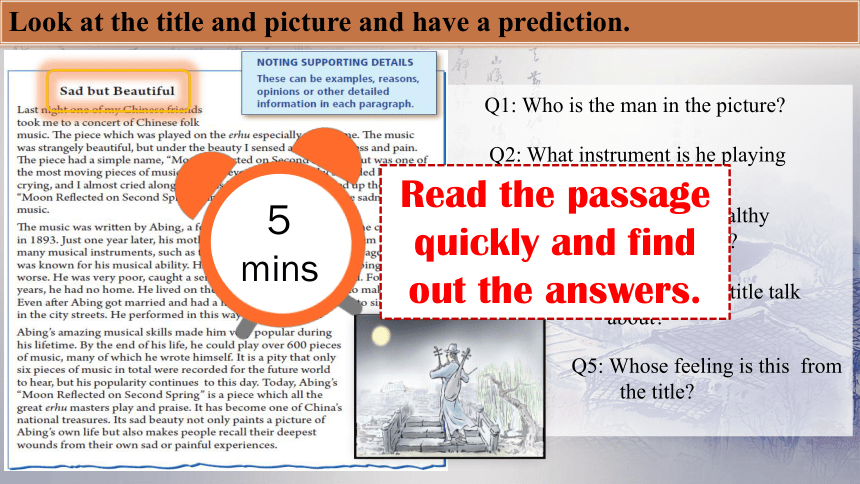
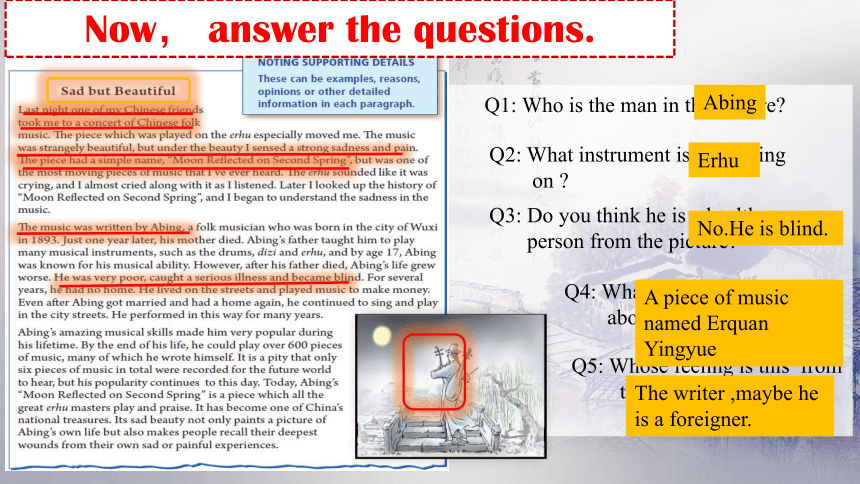

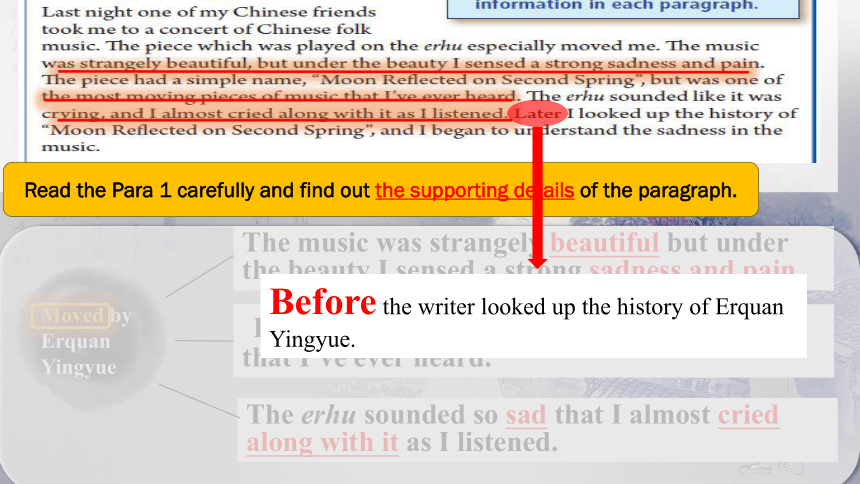
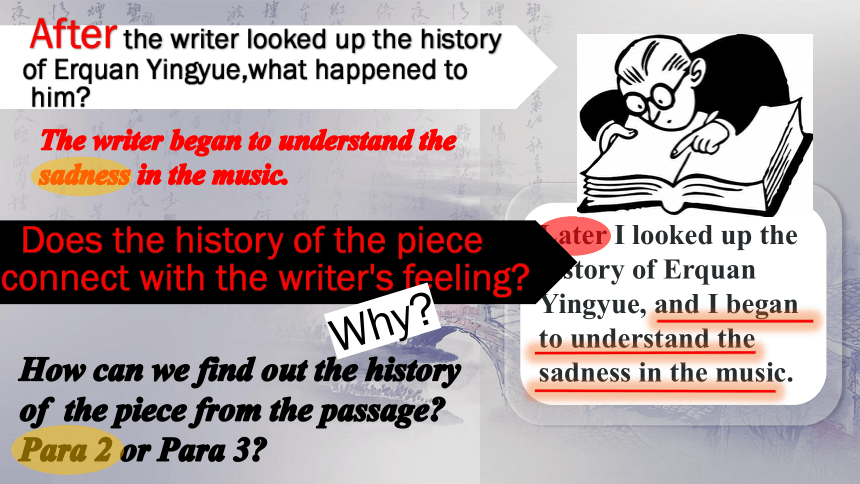
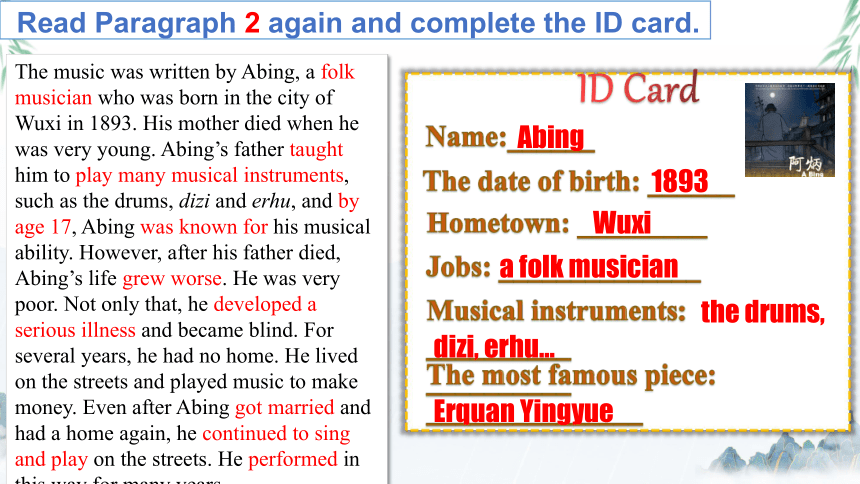
文档简介
(共48张PPT)
Section B 3a-3c
Unit 9
I like music that I can dance to.
Do you like Chinese folk music
folk music
What folk music do you know
China's national treasures
What’s the name of this piece of music
What kind of Chinese musical instrument is it
Guzheng
High Mountain and Floating Water
What’s the name of this piece of music
What kind of Chinese musical instrument is it
pipa
Spring Snow
What’s the name of this piece of music
What kind of Chinese musical instrument is it
《二泉映月》是我国民族音乐的经典,乐曲旋律委婉流畅、跌宕起伏、意境深邃——时而像对美好景色的回忆,时而又像对黑暗社会的控诉,具有强烈的艺术感染力。此曲本为二胡独奏作品,如今已有多种民族乐器的改编独奏版本以及交响乐队的器乐合奏版本。
What do you want to know about this piece
Who is the writer of the piece
Who was the first to play it
What's the story behind
the piece
Look at the title and picture and have a prediction.
Q1: Who is the man in the picture
Q2: What instrument is he playing
on
Q3: Do you think he is a healthy
person from the picture
Q4: What does the title talk
about
Q5: Whose feeling is this from
the title
Read the passage quickly and find out the answers.
5
mins
Q1: Who is the man in the picture
Q2: What instrument is he playing
on
Q3: Do you think he is a healthy
person from the picture
Q4: What does the title talk
about
Q5: Whose feeling is this from
the title
Now, answer the questions.
Abing
Erhu
No.He is blind.
A piece of music named Erquan Yingyue
The writer ,maybe he is a foreigner.
Can you match the main idea with each paragraph
Para 1
Para 2
Para 3
Abing’s hard Life
Moved by Erquan Yingyue
Abing’s Musical Achievements
How do you know that
Supporting details
Read the Para 1 carefully and find out the supporting details of the paragraph.
Moved by Erquan Yingyue
The music was strangely beautiful but under the beauty I sensed a strong sadness and pain.
It was one of the most moving pieces of music that I’ve ever heard.
The erhu sounded so sad that I almost cried along with it as I listened.
Before the writer looked up the history of Erquan Yingyue.
Later I looked up the history of Erquan Yingyue, and I began to understand the sadness in the music.
After the writer looked up the history
of Erquan Yingyue,what happened to
him e
The writer began to understand the sadness in the music.
Does the history of the piece connect with the writer's feeling
Why
How can we find out the history
of the piece from the passage
Para 2 or Para 3
Read Paragraph 2 again and complete the ID card.
ID Card
The date of birth: ______
Hometown: _________
Name:______
Jobs: ______________
Abing
1893
Wuxi
Musical instruments: __________
__________
The most famous piece: _______________
a folk musician
the drums,
dizi, erhu…
Erquan Yingyue
The music was written by Abing, a folk musician who was born in the city of Wuxi in 1893. His mother died when he was very young. Abing’s father taught him to play many musical instruments, such as the drums, dizi and erhu, and by age 17, Abing was known for his musical ability. However, after his father died, Abing’s life grew worse. He was very poor. Not only that, he developed a serious illness and became blind. For several years, he had no home. He lived on the streets and played music to make money. Even after Abing got married and had a home again, he continued to sing and play on the streets. He performed in this way for many years.
Main idea Supporting details
His mother died when he was very young.
His father died when he was a teenager.
He was poor and homeless.
He developed an illness and became blind.
He played music on the streets to make money. He performed in this way for many years.
Abing lived a very _______ life.
hard/poor
Read Paragraph 2 and finish the chart.
The music was written by Abing, a folk musician who was born in the city of Wuxi in 1893. His mother died when he was very young. Abing’s father taught him to play many musical instruments, such as the drums, dizi and erhu, and by age 17, Abing was known for his musical ability. However, after his father died, Abing’s life grew worse. He was very poor. Not only that, he developed a serious illness and became blind. For several years, he had no home. He lived on the streets and played music to make money. Even after Abing got married and had a home again, he continued to sing and play on the streets. He performed in this way for many years.
hard life
In 1893,
When he was young,
By the age of 17,
After his father died,
he was born
his mother died
known by his musical ability
life get worse
poor—serious illness—blind—no home—lived on the street
Had Abing's life always been so hard
No, he got married and had a home again.
And he can make money by playing music.
In your opinions, why did he continue to sing and play on the street after his life got better
The love of music
To make money
What do you think of Abing
from Para 2
pitiful
(可怜的)
talented in music
has love for life and music
a strong-mind man
Role-play
Imagine you are Abing , tell your experiences to people.
Abing's amazing musical skills made him very popular during his lifetime. By the end of his life, he could play over 600 pieces of music. Many of these were written by Abing himself. It is a pity that only six pieces of music in total were recorded for the future world to hear, but his popularity continues to this day. Today, Abing's Erquan Yingyue is a piece which all the great erhu masters play and praise. It has become one of China's national treasures. Its sad beauty not only paints a picture of Abing's own life but also makes people recall their deepest wounds from their own sad or painful experiences.
Main idea Supporting details
Abing’s musical skills made him very _______.
popular
1.He could play over 600 pieces, and he wrote many of them himself.
2.Erhu masters still play and praise his music today.
3.Erquan Yingyue has become one of China’s national treasures.
Read Paragraph 3 and finish the chart.
Abing's amazing musical skills made him very popular during his lifetime. By the end of his life, he could play over 600 pieces of music. Many of these were written by Abing himself. It is a pity that only six pieces of music in total were recorded for the future world to hear, but his popularity continues to this day. Today, Abing's Erquan Yingyue is a piece which all the great erhu masters play and praise. It has become one of China's national treasures. Its sad beauty not only paints a picture of Abing's own life but also makes people recall their deepest wounds from their own sad or painful experiences.
Why does Erquan Yingyue become so popular
Its sad beauty not only paints a picture of Abing’s own life but also
makes people recall their deepest wounds from their own sad or painful experiences.
Sad but Beautiful
moved by Erquan Yingyue
Abing's hard life
Abing's achievement
strangely beautiful, but I sensed a strong sadness and pain
one of the most moving pieces of music
sounded so sad that I almost cried
looked up the history of Erquan Yingyue,
and began to understand the sadness.
Sad but Beautiful
moved by Erquan Yingyue
Abing's hard life
Abing's achievement
the music was written by Abing (承接上文,引出下文)
born in Wuxi in 1893→his mother died→played many musical instruments→his father died→became blind→had no home→lived on the streets→got married→continued to sing and play
Abing’s amazing musical skills made him very popular during his lifetime (本段主题句)
played over 600 pieces of music, but only six pieces of music were recorded
Erquan Yingyue has become one of China’s national treasures
make people recall their deepest wounds
from their own sad or painful experiences
过渡句,
引出下文
呼应开头
升华主题
Retell the passage
The great works always strike a chord (共鸣) with the audience.
A blind man
Achievement
How
have deep love for life and music
amazing musical skills
talented in music
never give up
Being blind is hard to imagine for common people.
But for those talented musicians, the light and brightness they feel inside can drive away all the darkness, which makes them see a clearer and more beautiful world.
Last night one of my Chinese friends took me to a concert of Chinese folk music. The piece which was played on the erhu especially moved me. The music was strangely beautiful, but under the beauty I sensed a strong sadness and pain. The piece had a simple name, Erquan Yingyue (Moon Reflected on Second Spring), but it was one of the most moving pieces of music that I’ve ever heard. The erhu sounded so sad that I almost cried along with it as I listened. Later I looked up the history of Erquan Yingyue, and I began to understand the sadness in the music.
Read Paragraph 1 and underline the language points.
Sad but Beautiful
一般过去时的被动语态
使用二胡,on意为“通过;使用;借助于”
先行词被最高级所修饰时,关系代词只能用that,不用which。
查阅;抬头往上看
1. The music was strangely beautiful, but under the beauty I sensed a
strong sadness and pain.
sense/ sens/ v. 感觉到;意识到 n. 感觉;意识
We all believe in him because he has a strong sense of dudy.
We can sense his sadness.
(1) sense在此处作及物动词,意为“感觉到;意识到” 。
(2) sense还可作可数名词,意为“感觉;意识”。常构成短语a sense of “......的感觉”。
Language points
sadness /'s dn s/ n. 悲伤;悲痛
Friends should share happiness and sadness.
He has a wide knowledge of music.
sadness由“sad ( adj.悲伤的) + -ness (名词后缀)”构成,通常用作不可数名词,但当其前有形容词修饰时,形容词前可加不定冠词,表示“一种……样的悲伤”。有类似用法的词还有education, help, knowledge等。
2. The music was strangely beautiful, but under the beauty I sensed a
strong sadness and pain.
ill (adj. 生病的) → illness (n.疾病)
kind (adj. 善良的) → kindness (n.善良)
happy (adj. 幸福的) → happiness (n. 幸福)
有些形容词后加-ness,构成名词,表示性质、状态或特点。
拓展延伸
pain /pe n/ n. 痛苦;疼痛;苦恼
She is going through the pleasures and pains of growing up.
His leg is broken and he is suffering great pain.
(1) pain既可用作可数名词,也可用作不可数名词。指精神或身体上的痛苦。其形容词为painful,意为“令人痛苦的;令人疼痛的”。
(2) pain后接“in +表示身体部位的名词”,指“某部位疼痛”。
He has a pain in the left leg.
3. The music was strangely beautiful, but under the beauty I sensed a strong sadness and pain.
reflect /r 'flekt/ v. 反映;映出
reflect作动词,常用于被动语态。其名词形式为reflection,意为“映像;反映”。
Her face was reflected in the mirror.
Can you see your reflection in the glass
Your clothes are often a reflection of your personality.
4. The piece had a simple name, Erquan Yingyue (Moon Reflected on Second Spring), but it was one of the most moving pieces of music that I’ve ever heard.
The piece had a simple name, Erquan Yingyue (Moon Reflected on Second Spring), but
it was one of the most moving pieces of music that I’ve ever heard.
作name的同位语
先行词
关系代词,在从句中作heard的宾语
并列连词,
表示转折关系
定语从句
句型剖析
1.一场中国民间音乐的音乐会
2.被二胡演奏
3.美不可言
4.感觉到了强烈的悲伤和痛苦
7.我听过的最感人的乐曲之一
8.听着它哭泣
9.查阅历史
10.开始理解音乐中的悲伤
a concert of Chinese folk
be played on the erhu
strangely beautiful
sense a strong sadness and pain
one of the most moving pieces of music
cry along with it
look up the history
begin to understand the sadness in the music
Key phrases
Last night one of my Chinese_____ (friend)______(take) me to a concert of Chinese folk music. The piece which ________(play) ___the erhu especially moved me. The music was ________(strange) beautiful, but under the beauty I sensed a strong________(sad) and pain. The piece had a simple name , Erquan Yingyue (Moon Reflected on Second Spring), but it was one of _______________ (moving) _________(piece) of music______(that/who)I have ever heard. The erhu sounded_____sad that I almost cried along______
it_____ I listened . Later I looked up the history of Erquan Yingyue, and I began____________(understand) the sadness in the music.
friends
took
was played
on
strangely
sadness
the most moving
pieces
that
so
with
as
to understand
Close your book and try to retell paragraph 1.
The music was written by Abing, a folk musician who was born in the city of Wuxi in 1893. His mother died when he was very young. Abing’s father taught him to play many musical instruments, such as the drums, dizi and erhu, and by age 17, Abing was known for his musical ability. However, after his father died, Abing’s life grew worse. He was very poor. Not only that, he developed a serious illness and became blind. For several years, he had no home. He lived on the streets and played music to make money. Even after Abing got married and had a home again, he continued to sing and play on the streets. He performed in this way for many years.
民间音乐家
弹奏多种乐器
到17岁
继续唱歌、表演
得了一种严重的疾病
因……而出名
Read Paragraph 2 and underline the language points.
5. He performed in this way for many years.
perform /p (r)'f (r)m/ v. 表演;执行
(1)perform在此处作动词,意为“表演”。
Do you know when this play was first performed
(2) perform 作动词时还可意为“执行”,此时与carry out意思相近。
One should always perform what he promises.
perform v. 表演 → performance n. 表演
→ performer n. 表演者
be written by
a folk musician
be born in the city of Wuxi
teach him to play many musical instruments
be known for his musical ability
grow worse
develop a serious illness and became blind
make money
get married
continue to sing
in this way
1.被…写
2.一位民间音乐家
3.出生在无锡城
4.教他演奏许多乐器
5.因他的音乐才能而出名
6.变得糟糕
7.得了一种严重的疾病并且失明了
8.赚钱
9.结婚
10.继续唱歌
11.用这种方式
Key phrases
The music_____________(write) by Abing, a folk musician_____(who/that) was born in Wuxi in 1893. His mother_____(die) when he was very young. ________(Abing) father taught him_________(play) many musical instruments , such as the drums, dizi and erhu, and _____ age 17, Abing was known______his musical ability. __________, after his father died, Abing's life grew ______(bad). He was very poor. Not only that, he developed a serious______ (ill) and became blind. For several years, he had no home. He lived on the street and played music to make money. Even after Abing got married and had a home again, he continued_______(sing) and play on the street. He __________(perform) in this way for many years.
was written
who
died
Abing's
to play
by
for
However
worse
illness
to sing
performed
Close your book and try to retell paragraph 2.
Abing’s amazing musical skills made him very popular during his lifetime. By the end of his life, he could play over 600 pieces of music. Many of these were written by Abing himself. It is a pity that only six pieces of music in total were recorded for the future world to hear, but his popularity continues to this day. Today, Abing’s Erquan Yingyue is a piece which all the great erhu masters play and praise. It has become one of China’s national treasures. Its sad beauty not only paints a picture of Abing’s own life but also makes people recall their deepest wounds from their own sad or painful experiences.
在他的有生之年
总共
成了中国民族瑰宝之一
描绘了阿炳自己的生活
悲伤或痛苦的经历
Read Paragraph 3 and underline the language points.
6. It is a pity that only six pieces of music in total were recorded for the future world to hear, …
pity /'p ti/ n. 遗憾;怜悯 v. 同情;怜悯
(1) pity在此处作名词,意为“遗憾”,相当于shame。
It would be a pity to give up now — you’ve nearly finished.
(2) pity作名词,还可意为“怜悯”,此时不等同于shame。take pity on ... 意为“同情/怜悯......”。
The old lady often takes pity on small animals.
(3) pity还可作动词,意为“同情;怜悯”。
Pity those on the street who are homeless.
in total / 't tl/ 总共;合计
in total 相当于in all。 其中total作名词,意为“总数;合计”。
How much are these apples in total
total还可作形容词,意为“总的,全体的,完全的”,通常用于名词前作定语。其副词形式为totally,意为“完全地;全部地;整个地”。
The total cost will be 200 dollars.
His behavior is totally unacceptable.
7. It is a pity that only six pieces of music in total were recorded for the future world to hear, …
8. Today, Abing’s Erquan Yingyue is a piece which all the great erhu
masters play and praise.
master /'mɑ st /, /'m st r/ n. 大师;能手;主人 v. 掌握
(1) master在此处作可数名词,意为“大师;能手”。此外,master作名词,还有“主人”的意思。
Mei Lanfang is a master of Bejing Opera.
The cat stayed beside its master until the end of his life.
(2) master还可作及物动词,意为“掌握”。
Duff soon mastered the skills of radio production. He was really a master of learning.
praise /pre z/ v. & n. 表扬;赞扬
(1) praise在此句中作动词,常用短语:praise sb. /sth. for (doing)sth. 因(做)某事而赞扬某人/某物。
The policeman praised the young man for saving the little girl.
Everyone praises Hangzhou for its scenery.
(2) praise 还可作名词,意为“赞扬;赞美” 。常用短语:in (high ) praise of “(高度)赞美......”; win/ receive praise (from...)“赢得/获得 ( ...... 的)称赞”
She wrote poems in praise of freedom.
9. Today, Abing’s Erquan Yingyue is a piece which all the great erhu
masters play and praise.
10. Its sad beauty not only paints a picture of Abing’s own life but also makes people recall their deepest wounds from their own sad or painful experiences.
recall /r k l/ v. 回忆起;回想起
recall由“re-(前缀) + call”构成,在此处作及物动词,其后接名词、代词、动词-ing形式或从句等作宾语。
I can’t recall it.
I can’t recall what he said at the meeting.
wound /wu nd/ n. 伤;伤口;创伤 v. 使(身体)受伤;伤害
(1) wound在此处作可数名词,意为“伤;伤口;创伤”。多指在战场上所受的刀伤、枪伤等,也可指精神上所受的伤害。
It’s reported that six soldiers died from wounds.
That was a wound to his pride.
(2) wound还可作动词,意为“使(身体)受伤;伤害”。
Two soldiers were wounded in the battle.
11. Its sad beauty not only paints a picture of Abing’s own life but also makes people recall their deepest wounds from their own sad or painful experiences.
painful / pe nfl/ adj. 令人痛苦的;令人疼痛的
painful作形容词,由“pain (n.疼痛) + 后缀-ful”构成,在句中可作表语或定语 。
He cried as he recalled the painful memory.
My ankle is still too painful to walk on.
12. Its sad beauty not only paints a picture of Abing’s own life but also makes people recall their deepest wounds from their own sad or painful experiences.
Abing’s amazing musical skills
during his lifetime
by the end of his life
It is a pity that…
be recorded
a piece which all the great erhu masters
play and praise
one of China’s national treasures
its sad beauty
recall their deepest wounds from their
own sad or painful experiences
in total
1.阿炳惊人的音乐技能
2.在他的一生中
3.在他的生命尽头
4.遗憾的是…
5.被录下来
6.一首所有伟大的二胡大师们
演奏和赞扬的乐曲
7.中国的国宝之一
8.它的凄美
9.从他们自己的悲伤或痛苦的
经历中回想起了他们最深的创伤
10.总计
Key phrases
Abing's amazing musical skills made him very popular during his lifetime. By the end of his life, he could play over 600 pieces of music. Many of these _____________(write) by Abing ________ (him). It is a pity that only six pieces of music in total_______________(record) for the future world to hear, but his___________( popular)continues to this day, Today, Abing's Erquan Yingyue is a piece _______(which/who)all the great erhu ________(master) play and praise. It has become one of China's national treasures. _____(it) sad beauty not only paints a picture of Abing's own life but also ________(make) people recall_______(they) deepest wounds from their own sad or painful_____________ (experience).
were written
himself
were recorded
popularity
which
masters
Its
makes
their
experiences
Close your book and try to retell paragraph 3.
Circle that or who and fill in the blanks with the words in the box.
Abing played music (that/who) could touch the hearts of people. When
we listen to his music, we can _________ both the beauty and the sadness in it. It makes us think about the ________ and _________ (that/who) we have experienced in the past. For this reason, many people _________ him as the musician who has greatly influenced erhu music. So it is really a _________ that not many pieces of his music were recorded.
pain
wounds
sense
pity
praise
sense
wounds
pain
praise
pity
2d
1. I was moved by the erhu piece, Erquan Yingyue. It was strangely beautiful.
________________________________________________________________________________________________________________
2. The music was written by Abing. Abing was a famous folk musician in China.
________________________________________________________________________________________________________________
I was moved by the erhu piece, Erquan Yingyue, which was strangely beautiful.
The music was written by Abing, who was a famous folk
musician in China.
Rewrite the following sentences by using the attributive clauses with that, which or who.
________________________________________________________________________________________________________________
________________________________________________________________________________________________________________
________________________________________________________________________________________________________________
4. Abing had amazing musical skills. The skills made him very popular during his lifetime.
5. Abing’s Erquan Yingyue is a famous music piece in China. All the great erhu masters play and praise it.
Abing developed a serious illness that/which made him become blind.
Abing had amazing musical skills that/which made him very
popular during his lifetime.
Abing’s Erquan Yingyue is a famous music piece in China that/which all the great erhu masters play and praise.
3. Abing developed a serious illness. The illness made him become blind.
Thank You
Section B 3a-3c
Unit 9
I like music that I can dance to.
Do you like Chinese folk music
folk music
What folk music do you know
China's national treasures
What’s the name of this piece of music
What kind of Chinese musical instrument is it
Guzheng
High Mountain and Floating Water
What’s the name of this piece of music
What kind of Chinese musical instrument is it
pipa
Spring Snow
What’s the name of this piece of music
What kind of Chinese musical instrument is it
《二泉映月》是我国民族音乐的经典,乐曲旋律委婉流畅、跌宕起伏、意境深邃——时而像对美好景色的回忆,时而又像对黑暗社会的控诉,具有强烈的艺术感染力。此曲本为二胡独奏作品,如今已有多种民族乐器的改编独奏版本以及交响乐队的器乐合奏版本。
What do you want to know about this piece
Who is the writer of the piece
Who was the first to play it
What's the story behind
the piece
Look at the title and picture and have a prediction.
Q1: Who is the man in the picture
Q2: What instrument is he playing
on
Q3: Do you think he is a healthy
person from the picture
Q4: What does the title talk
about
Q5: Whose feeling is this from
the title
Read the passage quickly and find out the answers.
5
mins
Q1: Who is the man in the picture
Q2: What instrument is he playing
on
Q3: Do you think he is a healthy
person from the picture
Q4: What does the title talk
about
Q5: Whose feeling is this from
the title
Now, answer the questions.
Abing
Erhu
No.He is blind.
A piece of music named Erquan Yingyue
The writer ,maybe he is a foreigner.
Can you match the main idea with each paragraph
Para 1
Para 2
Para 3
Abing’s hard Life
Moved by Erquan Yingyue
Abing’s Musical Achievements
How do you know that
Supporting details
Read the Para 1 carefully and find out the supporting details of the paragraph.
Moved by Erquan Yingyue
The music was strangely beautiful but under the beauty I sensed a strong sadness and pain.
It was one of the most moving pieces of music that I’ve ever heard.
The erhu sounded so sad that I almost cried along with it as I listened.
Before the writer looked up the history of Erquan Yingyue.
Later I looked up the history of Erquan Yingyue, and I began to understand the sadness in the music.
After the writer looked up the history
of Erquan Yingyue,what happened to
him e
The writer began to understand the sadness in the music.
Does the history of the piece connect with the writer's feeling
Why
How can we find out the history
of the piece from the passage
Para 2 or Para 3
Read Paragraph 2 again and complete the ID card.
ID Card
The date of birth: ______
Hometown: _________
Name:______
Jobs: ______________
Abing
1893
Wuxi
Musical instruments: __________
__________
The most famous piece: _______________
a folk musician
the drums,
dizi, erhu…
Erquan Yingyue
The music was written by Abing, a folk musician who was born in the city of Wuxi in 1893. His mother died when he was very young. Abing’s father taught him to play many musical instruments, such as the drums, dizi and erhu, and by age 17, Abing was known for his musical ability. However, after his father died, Abing’s life grew worse. He was very poor. Not only that, he developed a serious illness and became blind. For several years, he had no home. He lived on the streets and played music to make money. Even after Abing got married and had a home again, he continued to sing and play on the streets. He performed in this way for many years.
Main idea Supporting details
His mother died when he was very young.
His father died when he was a teenager.
He was poor and homeless.
He developed an illness and became blind.
He played music on the streets to make money. He performed in this way for many years.
Abing lived a very _______ life.
hard/poor
Read Paragraph 2 and finish the chart.
The music was written by Abing, a folk musician who was born in the city of Wuxi in 1893. His mother died when he was very young. Abing’s father taught him to play many musical instruments, such as the drums, dizi and erhu, and by age 17, Abing was known for his musical ability. However, after his father died, Abing’s life grew worse. He was very poor. Not only that, he developed a serious illness and became blind. For several years, he had no home. He lived on the streets and played music to make money. Even after Abing got married and had a home again, he continued to sing and play on the streets. He performed in this way for many years.
hard life
In 1893,
When he was young,
By the age of 17,
After his father died,
he was born
his mother died
known by his musical ability
life get worse
poor—serious illness—blind—no home—lived on the street
Had Abing's life always been so hard
No, he got married and had a home again.
And he can make money by playing music.
In your opinions, why did he continue to sing and play on the street after his life got better
The love of music
To make money
What do you think of Abing
from Para 2
pitiful
(可怜的)
talented in music
has love for life and music
a strong-mind man
Role-play
Imagine you are Abing , tell your experiences to people.
Abing's amazing musical skills made him very popular during his lifetime. By the end of his life, he could play over 600 pieces of music. Many of these were written by Abing himself. It is a pity that only six pieces of music in total were recorded for the future world to hear, but his popularity continues to this day. Today, Abing's Erquan Yingyue is a piece which all the great erhu masters play and praise. It has become one of China's national treasures. Its sad beauty not only paints a picture of Abing's own life but also makes people recall their deepest wounds from their own sad or painful experiences.
Main idea Supporting details
Abing’s musical skills made him very _______.
popular
1.He could play over 600 pieces, and he wrote many of them himself.
2.Erhu masters still play and praise his music today.
3.Erquan Yingyue has become one of China’s national treasures.
Read Paragraph 3 and finish the chart.
Abing's amazing musical skills made him very popular during his lifetime. By the end of his life, he could play over 600 pieces of music. Many of these were written by Abing himself. It is a pity that only six pieces of music in total were recorded for the future world to hear, but his popularity continues to this day. Today, Abing's Erquan Yingyue is a piece which all the great erhu masters play and praise. It has become one of China's national treasures. Its sad beauty not only paints a picture of Abing's own life but also makes people recall their deepest wounds from their own sad or painful experiences.
Why does Erquan Yingyue become so popular
Its sad beauty not only paints a picture of Abing’s own life but also
makes people recall their deepest wounds from their own sad or painful experiences.
Sad but Beautiful
moved by Erquan Yingyue
Abing's hard life
Abing's achievement
strangely beautiful, but I sensed a strong sadness and pain
one of the most moving pieces of music
sounded so sad that I almost cried
looked up the history of Erquan Yingyue,
and began to understand the sadness.
Sad but Beautiful
moved by Erquan Yingyue
Abing's hard life
Abing's achievement
the music was written by Abing (承接上文,引出下文)
born in Wuxi in 1893→his mother died→played many musical instruments→his father died→became blind→had no home→lived on the streets→got married→continued to sing and play
Abing’s amazing musical skills made him very popular during his lifetime (本段主题句)
played over 600 pieces of music, but only six pieces of music were recorded
Erquan Yingyue has become one of China’s national treasures
make people recall their deepest wounds
from their own sad or painful experiences
过渡句,
引出下文
呼应开头
升华主题
Retell the passage
The great works always strike a chord (共鸣) with the audience.
A blind man
Achievement
How
have deep love for life and music
amazing musical skills
talented in music
never give up
Being blind is hard to imagine for common people.
But for those talented musicians, the light and brightness they feel inside can drive away all the darkness, which makes them see a clearer and more beautiful world.
Last night one of my Chinese friends took me to a concert of Chinese folk music. The piece which was played on the erhu especially moved me. The music was strangely beautiful, but under the beauty I sensed a strong sadness and pain. The piece had a simple name, Erquan Yingyue (Moon Reflected on Second Spring), but it was one of the most moving pieces of music that I’ve ever heard. The erhu sounded so sad that I almost cried along with it as I listened. Later I looked up the history of Erquan Yingyue, and I began to understand the sadness in the music.
Read Paragraph 1 and underline the language points.
Sad but Beautiful
一般过去时的被动语态
使用二胡,on意为“通过;使用;借助于”
先行词被最高级所修饰时,关系代词只能用that,不用which。
查阅;抬头往上看
1. The music was strangely beautiful, but under the beauty I sensed a
strong sadness and pain.
sense/ sens/ v. 感觉到;意识到 n. 感觉;意识
We all believe in him because he has a strong sense of dudy.
We can sense his sadness.
(1) sense在此处作及物动词,意为“感觉到;意识到” 。
(2) sense还可作可数名词,意为“感觉;意识”。常构成短语a sense of “......的感觉”。
Language points
sadness /'s dn s/ n. 悲伤;悲痛
Friends should share happiness and sadness.
He has a wide knowledge of music.
sadness由“sad ( adj.悲伤的) + -ness (名词后缀)”构成,通常用作不可数名词,但当其前有形容词修饰时,形容词前可加不定冠词,表示“一种……样的悲伤”。有类似用法的词还有education, help, knowledge等。
2. The music was strangely beautiful, but under the beauty I sensed a
strong sadness and pain.
ill (adj. 生病的) → illness (n.疾病)
kind (adj. 善良的) → kindness (n.善良)
happy (adj. 幸福的) → happiness (n. 幸福)
有些形容词后加-ness,构成名词,表示性质、状态或特点。
拓展延伸
pain /pe n/ n. 痛苦;疼痛;苦恼
She is going through the pleasures and pains of growing up.
His leg is broken and he is suffering great pain.
(1) pain既可用作可数名词,也可用作不可数名词。指精神或身体上的痛苦。其形容词为painful,意为“令人痛苦的;令人疼痛的”。
(2) pain后接“in +表示身体部位的名词”,指“某部位疼痛”。
He has a pain in the left leg.
3. The music was strangely beautiful, but under the beauty I sensed a strong sadness and pain.
reflect /r 'flekt/ v. 反映;映出
reflect作动词,常用于被动语态。其名词形式为reflection,意为“映像;反映”。
Her face was reflected in the mirror.
Can you see your reflection in the glass
Your clothes are often a reflection of your personality.
4. The piece had a simple name, Erquan Yingyue (Moon Reflected on Second Spring), but it was one of the most moving pieces of music that I’ve ever heard.
The piece had a simple name, Erquan Yingyue (Moon Reflected on Second Spring), but
it was one of the most moving pieces of music that I’ve ever heard.
作name的同位语
先行词
关系代词,在从句中作heard的宾语
并列连词,
表示转折关系
定语从句
句型剖析
1.一场中国民间音乐的音乐会
2.被二胡演奏
3.美不可言
4.感觉到了强烈的悲伤和痛苦
7.我听过的最感人的乐曲之一
8.听着它哭泣
9.查阅历史
10.开始理解音乐中的悲伤
a concert of Chinese folk
be played on the erhu
strangely beautiful
sense a strong sadness and pain
one of the most moving pieces of music
cry along with it
look up the history
begin to understand the sadness in the music
Key phrases
Last night one of my Chinese_____ (friend)______(take) me to a concert of Chinese folk music. The piece which ________(play) ___the erhu especially moved me. The music was ________(strange) beautiful, but under the beauty I sensed a strong________(sad) and pain. The piece had a simple name , Erquan Yingyue (Moon Reflected on Second Spring), but it was one of _______________ (moving) _________(piece) of music______(that/who)I have ever heard. The erhu sounded_____sad that I almost cried along______
it_____ I listened . Later I looked up the history of Erquan Yingyue, and I began____________(understand) the sadness in the music.
friends
took
was played
on
strangely
sadness
the most moving
pieces
that
so
with
as
to understand
Close your book and try to retell paragraph 1.
The music was written by Abing, a folk musician who was born in the city of Wuxi in 1893. His mother died when he was very young. Abing’s father taught him to play many musical instruments, such as the drums, dizi and erhu, and by age 17, Abing was known for his musical ability. However, after his father died, Abing’s life grew worse. He was very poor. Not only that, he developed a serious illness and became blind. For several years, he had no home. He lived on the streets and played music to make money. Even after Abing got married and had a home again, he continued to sing and play on the streets. He performed in this way for many years.
民间音乐家
弹奏多种乐器
到17岁
继续唱歌、表演
得了一种严重的疾病
因……而出名
Read Paragraph 2 and underline the language points.
5. He performed in this way for many years.
perform /p (r)'f (r)m/ v. 表演;执行
(1)perform在此处作动词,意为“表演”。
Do you know when this play was first performed
(2) perform 作动词时还可意为“执行”,此时与carry out意思相近。
One should always perform what he promises.
perform v. 表演 → performance n. 表演
→ performer n. 表演者
be written by
a folk musician
be born in the city of Wuxi
teach him to play many musical instruments
be known for his musical ability
grow worse
develop a serious illness and became blind
make money
get married
continue to sing
in this way
1.被…写
2.一位民间音乐家
3.出生在无锡城
4.教他演奏许多乐器
5.因他的音乐才能而出名
6.变得糟糕
7.得了一种严重的疾病并且失明了
8.赚钱
9.结婚
10.继续唱歌
11.用这种方式
Key phrases
The music_____________(write) by Abing, a folk musician_____(who/that) was born in Wuxi in 1893. His mother_____(die) when he was very young. ________(Abing) father taught him_________(play) many musical instruments , such as the drums, dizi and erhu, and _____ age 17, Abing was known______his musical ability. __________, after his father died, Abing's life grew ______(bad). He was very poor. Not only that, he developed a serious______ (ill) and became blind. For several years, he had no home. He lived on the street and played music to make money. Even after Abing got married and had a home again, he continued_______(sing) and play on the street. He __________(perform) in this way for many years.
was written
who
died
Abing's
to play
by
for
However
worse
illness
to sing
performed
Close your book and try to retell paragraph 2.
Abing’s amazing musical skills made him very popular during his lifetime. By the end of his life, he could play over 600 pieces of music. Many of these were written by Abing himself. It is a pity that only six pieces of music in total were recorded for the future world to hear, but his popularity continues to this day. Today, Abing’s Erquan Yingyue is a piece which all the great erhu masters play and praise. It has become one of China’s national treasures. Its sad beauty not only paints a picture of Abing’s own life but also makes people recall their deepest wounds from their own sad or painful experiences.
在他的有生之年
总共
成了中国民族瑰宝之一
描绘了阿炳自己的生活
悲伤或痛苦的经历
Read Paragraph 3 and underline the language points.
6. It is a pity that only six pieces of music in total were recorded for the future world to hear, …
pity /'p ti/ n. 遗憾;怜悯 v. 同情;怜悯
(1) pity在此处作名词,意为“遗憾”,相当于shame。
It would be a pity to give up now — you’ve nearly finished.
(2) pity作名词,还可意为“怜悯”,此时不等同于shame。take pity on ... 意为“同情/怜悯......”。
The old lady often takes pity on small animals.
(3) pity还可作动词,意为“同情;怜悯”。
Pity those on the street who are homeless.
in total / 't tl/ 总共;合计
in total 相当于in all。 其中total作名词,意为“总数;合计”。
How much are these apples in total
total还可作形容词,意为“总的,全体的,完全的”,通常用于名词前作定语。其副词形式为totally,意为“完全地;全部地;整个地”。
The total cost will be 200 dollars.
His behavior is totally unacceptable.
7. It is a pity that only six pieces of music in total were recorded for the future world to hear, …
8. Today, Abing’s Erquan Yingyue is a piece which all the great erhu
masters play and praise.
master /'mɑ st /, /'m st r/ n. 大师;能手;主人 v. 掌握
(1) master在此处作可数名词,意为“大师;能手”。此外,master作名词,还有“主人”的意思。
Mei Lanfang is a master of Bejing Opera.
The cat stayed beside its master until the end of his life.
(2) master还可作及物动词,意为“掌握”。
Duff soon mastered the skills of radio production. He was really a master of learning.
praise /pre z/ v. & n. 表扬;赞扬
(1) praise在此句中作动词,常用短语:praise sb. /sth. for (doing)sth. 因(做)某事而赞扬某人/某物。
The policeman praised the young man for saving the little girl.
Everyone praises Hangzhou for its scenery.
(2) praise 还可作名词,意为“赞扬;赞美” 。常用短语:in (high ) praise of “(高度)赞美......”; win/ receive praise (from...)“赢得/获得 ( ...... 的)称赞”
She wrote poems in praise of freedom.
9. Today, Abing’s Erquan Yingyue is a piece which all the great erhu
masters play and praise.
10. Its sad beauty not only paints a picture of Abing’s own life but also makes people recall their deepest wounds from their own sad or painful experiences.
recall /r k l/ v. 回忆起;回想起
recall由“re-(前缀) + call”构成,在此处作及物动词,其后接名词、代词、动词-ing形式或从句等作宾语。
I can’t recall it.
I can’t recall what he said at the meeting.
wound /wu nd/ n. 伤;伤口;创伤 v. 使(身体)受伤;伤害
(1) wound在此处作可数名词,意为“伤;伤口;创伤”。多指在战场上所受的刀伤、枪伤等,也可指精神上所受的伤害。
It’s reported that six soldiers died from wounds.
That was a wound to his pride.
(2) wound还可作动词,意为“使(身体)受伤;伤害”。
Two soldiers were wounded in the battle.
11. Its sad beauty not only paints a picture of Abing’s own life but also makes people recall their deepest wounds from their own sad or painful experiences.
painful / pe nfl/ adj. 令人痛苦的;令人疼痛的
painful作形容词,由“pain (n.疼痛) + 后缀-ful”构成,在句中可作表语或定语 。
He cried as he recalled the painful memory.
My ankle is still too painful to walk on.
12. Its sad beauty not only paints a picture of Abing’s own life but also makes people recall their deepest wounds from their own sad or painful experiences.
Abing’s amazing musical skills
during his lifetime
by the end of his life
It is a pity that…
be recorded
a piece which all the great erhu masters
play and praise
one of China’s national treasures
its sad beauty
recall their deepest wounds from their
own sad or painful experiences
in total
1.阿炳惊人的音乐技能
2.在他的一生中
3.在他的生命尽头
4.遗憾的是…
5.被录下来
6.一首所有伟大的二胡大师们
演奏和赞扬的乐曲
7.中国的国宝之一
8.它的凄美
9.从他们自己的悲伤或痛苦的
经历中回想起了他们最深的创伤
10.总计
Key phrases
Abing's amazing musical skills made him very popular during his lifetime. By the end of his life, he could play over 600 pieces of music. Many of these _____________(write) by Abing ________ (him). It is a pity that only six pieces of music in total_______________(record) for the future world to hear, but his___________( popular)continues to this day, Today, Abing's Erquan Yingyue is a piece _______(which/who)all the great erhu ________(master) play and praise. It has become one of China's national treasures. _____(it) sad beauty not only paints a picture of Abing's own life but also ________(make) people recall_______(they) deepest wounds from their own sad or painful_____________ (experience).
were written
himself
were recorded
popularity
which
masters
Its
makes
their
experiences
Close your book and try to retell paragraph 3.
Circle that or who and fill in the blanks with the words in the box.
Abing played music (that/who) could touch the hearts of people. When
we listen to his music, we can _________ both the beauty and the sadness in it. It makes us think about the ________ and _________ (that/who) we have experienced in the past. For this reason, many people _________ him as the musician who has greatly influenced erhu music. So it is really a _________ that not many pieces of his music were recorded.
pain
wounds
sense
pity
praise
sense
wounds
pain
praise
pity
2d
1. I was moved by the erhu piece, Erquan Yingyue. It was strangely beautiful.
________________________________________________________________________________________________________________
2. The music was written by Abing. Abing was a famous folk musician in China.
________________________________________________________________________________________________________________
I was moved by the erhu piece, Erquan Yingyue, which was strangely beautiful.
The music was written by Abing, who was a famous folk
musician in China.
Rewrite the following sentences by using the attributive clauses with that, which or who.
________________________________________________________________________________________________________________
________________________________________________________________________________________________________________
________________________________________________________________________________________________________________
4. Abing had amazing musical skills. The skills made him very popular during his lifetime.
5. Abing’s Erquan Yingyue is a famous music piece in China. All the great erhu masters play and praise it.
Abing developed a serious illness that/which made him become blind.
Abing had amazing musical skills that/which made him very
popular during his lifetime.
Abing’s Erquan Yingyue is a famous music piece in China that/which all the great erhu masters play and praise.
3. Abing developed a serious illness. The illness made him become blind.
Thank You
同课章节目录
- Unit 1 How can we become good learners.
- Section A
- Section B
- Unit 2 I think that mooncakes are delicious!
- Section A
- Section B
- Unit 3 Could you please tell me where the restroom
- Section A
- Section B
- Unit 4 I used to be afraid of the dark.
- Section A
- Section B
- Unit 5 What are the shirts made of?
- Section A
- Section B
- Review of Units 1-5
- Unit 6 When was it invented?
- Section A
- Section B
- Unit 7 Teenagers should be allowed to choose their
- Section A
- Section B
- Unit 8 It must belong to Carla.
- Section A
- Section B
- Unit 9 I like music that I can dance to.
- Section A
- Section B
- Unit 10 You're supposed to shake hands.
- Section A
- Section B
- Review of Units 6-10
- Unit 11 Sad movies make me cry.
- Section A
- Section B
- Unit 12 Life is full of the unexpected
- Section A
- Section B
- Unit 13 We're trying to save the earth!
- Section A
- Section B
- Unit 14 I remember meeting all of you in Grade 7.
- Section A
- Section B
- Review of Units 11-14
